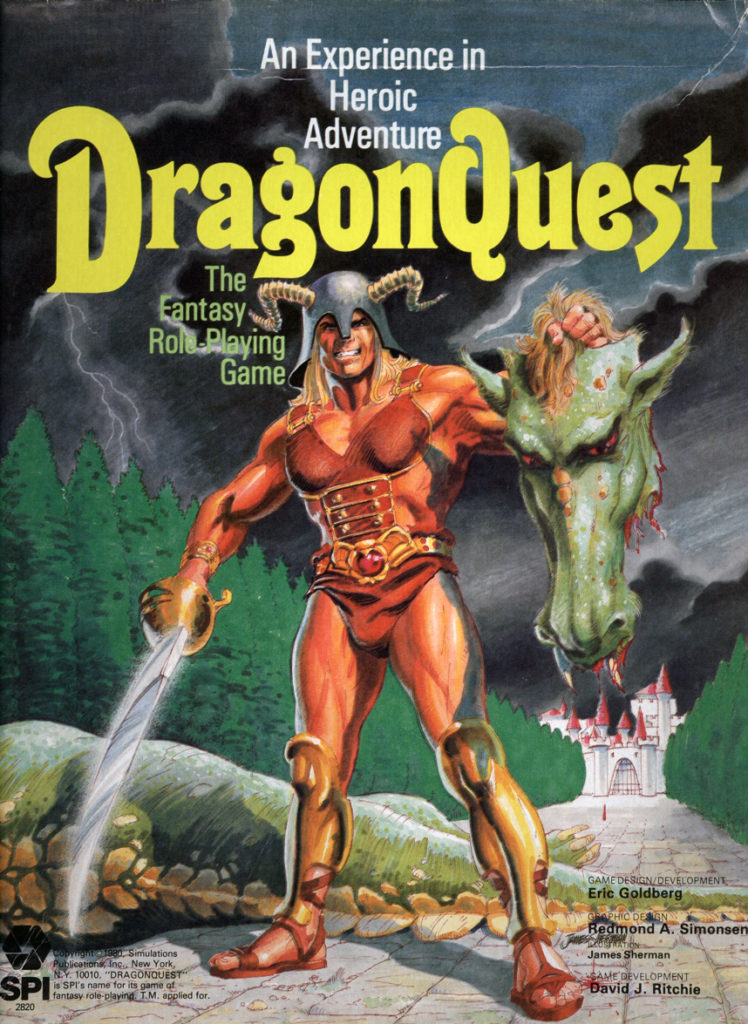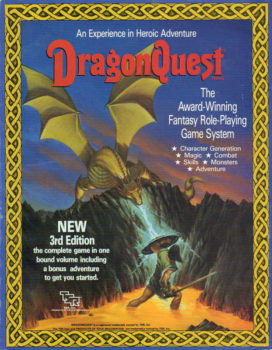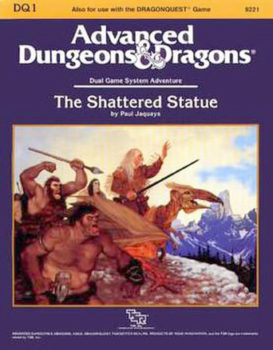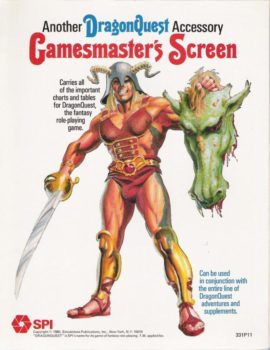Early Competition for D&D: DragonQuest
Throughout the 1970s and very early 1980s, Simulations Publications, Inc. (SPI) was a company known for its board war games. Then in 1980 it took a stab at the growing popularity of Dungeons & Dragons and other popular tabletop role-playing games. SPI came up with a different style of fantasy RPG known as DragonQuest (DQ), published in a boxed set with multiple books.
Eventually there would be three versions of DQ. SPI published a second edition in 1982 in a single book, but soon after the company was purchased by TSR, the developers of D&D. Eventually in 1989 TSR would produce the final, third edition of DQ, this one also in a single book, but since then they have done next to nothing with the property though they did release a few gaming modules for the system. Fortunately a few other companies also released DQ-related material and to this day there is a somewhat active DQ community online. As for the three versions of the game, they are pretty much compatible with few differences between them, especially between the second and third editions.
Created by Eric Goldberg, later known for his role in the publication of the tabletop RPG Paranoia and numerous other games both at the table and online, DragonQuest separated itself from D&D and its imitators by not focusing so much upon a class system for character creation and advancement. Instead, characters in DQ were mostly based upon growth in skill rankings.
Admittedly the skills system for DQ was far from balanced and could be a bit clunky and complicated. Worse yet, there was math involved. Yes, the dreaded math. Practically everything in DQ was based upon a percentile system, which meant players only needed one or two ten-sided dice for the game, but that’s where the complications and the math came in. The basics were easy enough, but when a character’s chances to make an attack are dependent upon their own percentage chance to hit with a particular weapon, the defenses of the target, and any number of variables, then things grow complex and can slow down combat. At the time this was not necessarily a unique system, but one not familiar to many a gamer, so there was a certain unfamiliarity that could breed contempt. However, for those who pressed through and became skilled DQ players, they would find combat speeding up the more they played, and the seemingly vast number of different rules concerning skills and combat would become second nature. This was not a game for those who wanted to jump right in and get the action flowing. This was not a simple game, especially for the time period.
To make matters even more complex, characters did not learn individual skills (with the exception of weapons), but learned a grouping of skills not dissimilar to the notion of character classes as presented in D&D. One did not simply take a lock picking skill, but took the Thief skill which was broken down into a number of lesser abilities such as lock picking, detecting traps, detecting hidden doors, etc. Characters did not hold onto Experience Points as in D&D, but spent their Experience Points as they gained ranks in a particular skill, up to a maximum of ten ranks. Common skills were Alchemist, Assassin,, Astrologer, Beast Master, Courtier, Healer, Mechanician, Merchant, Military Scientist, Navigator, Ranger, Spy, Thief, and Troubadour. My personal favorite skill was that of the Military Scientist which allowed a player to call for a short break at the beginning of each combat round for table discussion, this break only a matter of seconds but usually long enough for a party of players to communicate with one another about what each should do or planned to do in the upcoming round, an ability that comes in quite useful.
Much like D&D, DragonQuest characters had individual stats rolled up at character creation. The primary stats, or Characteristics, will sound vaguely familiar but also somewhat different. Those stats were Physical Strength, Endurance, Agility, Manual Dexterity, Willpower, Magical Aptitude and Fatigue.
Then there were the various races, all familiar to regular players of fantasy tabletop RPGs, such as dwarf, elf, halfling, orc, giant, human, etc. Characters also had a randomly-rolled Heritage which could promise wealth as a noble or poverty as Poor Trash. Also, there were Aspects, basically a randomly-rolled time of birth which gave a character some few special abilities, though these rarely came up in play.
Since I briefly mentioned combat above, I think it would be a disservice not to jump into that part of the game. First off, likely because of SPI’s wargaming roots, a hexagonal tactical map and miniatures are necessary to play combat in DragonQuest the way the rules are written. A character’s Tactical Movement Rate (TMR) is based upon Agility with most characters being able to move 4 to 6 hexes per combat round. One main reason a hex map is important for DQ combat is because a character’s facing comes into play, with attacks from the rear and sometimes the sides being more deadly than attacks from the front.
A character’s chance to hit in combat is based upon a percentage that combines the utilized weapon’s Base Chance plus the character’s Manual Dexterity and other factors such as lighting conditions, the target’s defenses, etc. Again, this can involve a fair amount of math and become complicated, especially when taking into account Special Damage, Grievous Injuries, and potentially dropped or broken weapons. Basically, the lower a player rolls on percentile dice during an attack, the better, with chances for that Special Damage and injuries but also chances for dropping or breaking a weapon. When a figure takes damage, the numerical damage done initially comes from Fatigue until that figure runs out of Fatigue, and then damage comes from the figure’s Endurance; however, an especially good roll of the percentile dice can allow the attack to skip the Fatigue and do direct damage to Endurance. When a character is out of Endurance, they are dead. Grievous Injuries, for which there’s a chart (DQ loves charts), are based upon three different weapon Classes, thrusting, slashing or crushing weapons. Grievous Injuries can be quite nasty, taking out an eye or removing a limb, or even leading to immediate death, and healing in DQ can be rare compared to similar game systems.
All in all, DQ combat tends to be somewhat more realistic than that of many tabletop RPGs, but it can also be time consuming, and it’s not without its difficulties. Combat is also more deadly than many an RPG, so much so that the game might turn off some players. DQ isn’t a game where characters become super heroes or near-gods who are unbeatable, but is a bit more down and dirty with even experienced characters having to take each and every combat quite seriously or they’ll end up dead.
Then there’s the magic system of DragonQuest. Those familiar with playing wizards and the like who simply snap off their spells willy-nilly will find that DQ magic isn’t quite so simple. For instance, like everything in DQ, casting a spell is based upon a percentage. Each individual spell has a base percentage to get the spell off, but then that percentage is affected by a character’s Magical Aptitude and, as always, other factors. A caster has to make a percentile roll for a spell to work. In other words, a caster’s spells are not automatic. Worse yet, a particularly bad roll can lead to a spell backfiring, and the results here can be quite disastrous, affecting not only the caster but possibly companions. As always in DQ, rolling low is better, rolling high is bad, sometimes very bad.
One nice element of DQ is that practically anyone can be a spell caster, at least as long as they have a decent Magical Aptitude score. Also, there are numerous colleges of magic (they vary somewhat from edition to edition of the game), with most casters specializing in a particular type of magic, examples being the College of Ensorcelments and Enchantments, the College of Illusions, and the College of Water Magics. There are even a few somewhat odd colleges which are different from the rest, such as the College of Naming Incantations which is based upon a caster knowing the True Name of others, and the College of Shaping Magics, which is mainly about creating magical items. Casters have at their disposal more than just spells, but can also make use of magical Talents and Rituals. Also, even spell casters can use weapons or wear armor, though such likely will reduce the chance for their spells to work, and casters can’t be in touch with cold iron or their magic definitely will not work.
Now about monsters. To tell the truth, there’s not a lot here to say as the DQ monsters will mostly be familiar to fans of fantasy. Of course there will be various undead and animals, and there will be the familiar dragons and giants. There isn’t a lot original here when it comes to the monsters, though it’s recommended players keep in mind that DQ combat is generally more deadly than that of many RPGs, so even a random combat encounter with a kobold, for example, should be taken serious.
Okay. Now I’ve written about the basics of DragonQuest and I’ve tried to be upfront about what some game masters and players consider to be negatives of this RPG, but the truth of the matter is that I love DragonQuest. It’s quite possibly my all-time favorite tabletop RPG. Also, though the game is little remembered nowadays, I do believe it had quite the influence upon later games, even some rules from more recent editions of D&D reminding me of DQ.
What do I love about the game? First and probably foremost, I love that the combat system is quite deadly. I also like the different schools of magic. And I love using a tactical map with miniatures, at least for these rules. Another factor has been that I’ve always felt DQ allowed me to create the characters I wanted to create without my being pigeonholed by character classes and the like. I even like the fact most everything in the game is based upon percentile rolls, because even as complicated as that can get, it somehow makes a certain amount of logic to my brain.
All that being said, DQ isn’t for everyone. Patience is the key, and I realize that’s easier said than done in today’s busy world. Still, if you’re looking for an old-school RPG that has deadly combat and is less limiting than player class systems, DragonQuest might be for you.
Ty Johnston is vice president of the Rogue Blades Foundation, a non-profit organization focused upon bringing heroic literature to all readers. A former newspaper editor, he is the author of several fantasy trilogies and novels, including City of Rogues and The God Sword.





I also love DQ, and for the same reasons you cite: for all its warts, and lacunae (no divine magic/clerics in the published game) it was a blast to play…even when we were blasting our PCs up with backfired fireballs. So many fond memories of those games…
I absolutely love this system. Way ahead of it’s time in spite of the flaws and the bonus adventure was a revelation to me as a young role-player. To have so much background information on the npc’s and so much flexibility in how the goals could be approached was impressive, especially for the time. It is nice to see coverage for a rarely discussed game.
Is he wearing a bra ?
Ty! I must know! I totally understand and respect your love for DragonQuest (which, until this article, I never had heard of). But your reasons for loving it naturally must remind me of two other games that I know of quite well: Rolemaster and Chivalry & Sorcery. In fact, because DQ is roll low, and because of how it’s schools of magic are named, it might be most like C&S.
What do you have to say, if anything, about how DQ compares to RM and C&S? They all seem to be of a sort to me.
Never played C&S, so I can’t rightly comment. However, I did play a little Rolemaster and some MERP back in the day, and Rolemaster struck me as sort of a more complex version of DragonQuest with hints of D&D tossed in. But it’s been more than 3 decades since I’ve played either Rolemaster or MERP, so it’s not impossible my memory is off.
I only ever remember this game was a thing because it’s why the Nintendo Dragon Quest games from Japan had to be renamed Dragon Warrior for the first three entries in English translation to avoid title conflict.
DragonQuest was not so much the math as it was the formally laid-out system, which clearly showed the SPI wargaming touches (which I, long-time subscriber to their bimonthly game magazine, Strategy & Tactics, easily recognized). The tactical system was a bit clunky in the 1st edition (Action Points, anyone?) but was better streamlined in the next 2 versions (which saw TMR hex amounts, instead). I, too, loved the idea of magical “colleges”, which cured one of the weird features of early RPGs, that of mages of miscellaneous spells. And the skills based on professions also seemed liked a good compromise between locking in abilities in Class systems, or again not providing any guidance in pure skill-based systems (like RuneQuest).
Another interesting thought was built into character generation, which was point-build, but with a randomized number of points. To balance the differing amounts, low-point characters were allowed a higher max total in any of their ability scores, so high-point characters were pushed toward “jack of all abilities, master of none”.
And the humor in the game was a good touch, like the last special ability listed for halflings: “A halfling may toss jewelry into large, semi-active volcanoes and no one will think worse of them for doing so.”
Man, we loved this game. We ditched D&D for DQ. We much preferred the combat and sort-of-skills sort-of-class aspects. Later we ditched it for the HERO System.
We still play this on Friday nights over skype. In fact, our original GM runs games after 45+ years. We long ago ditched the hex maps, though.